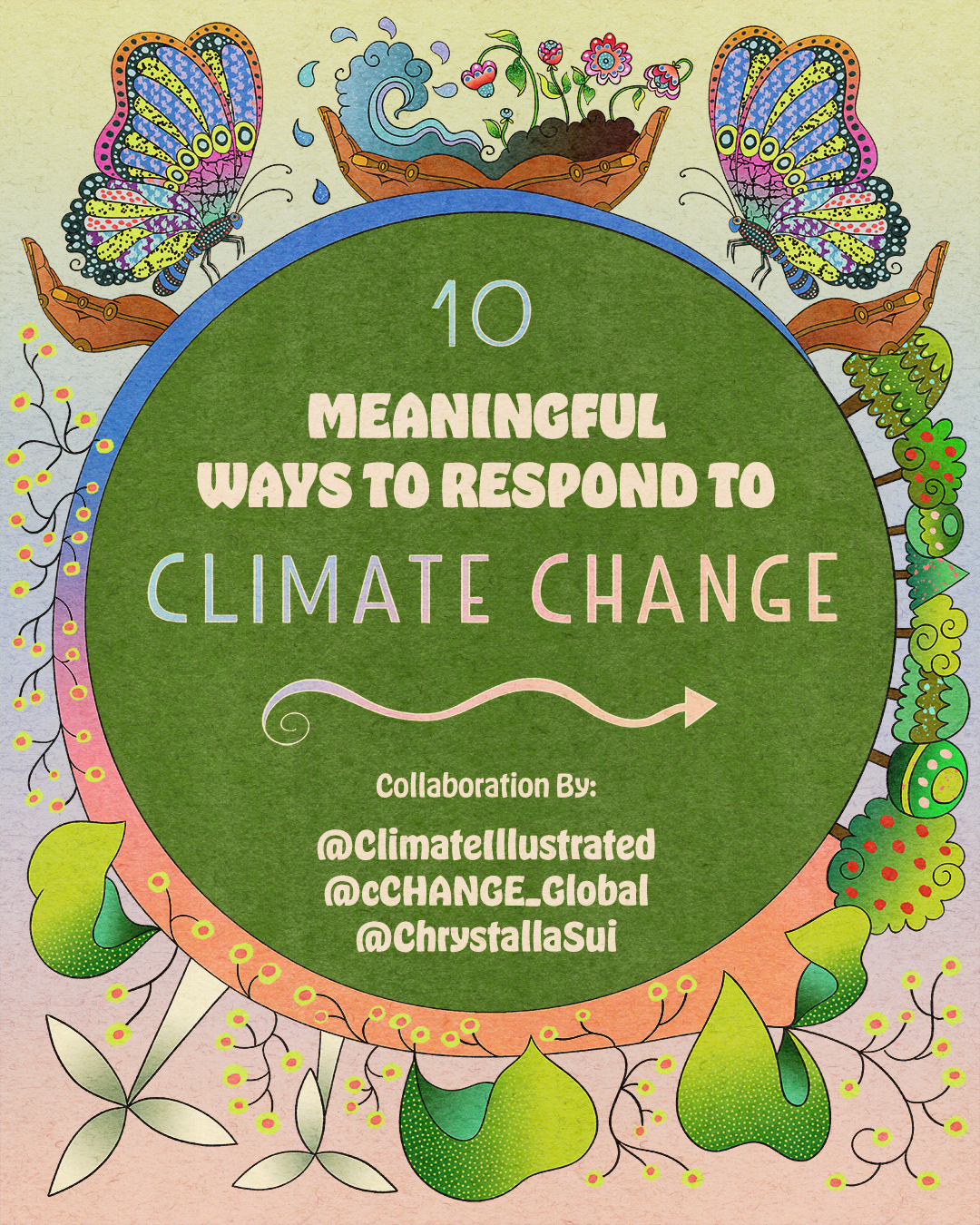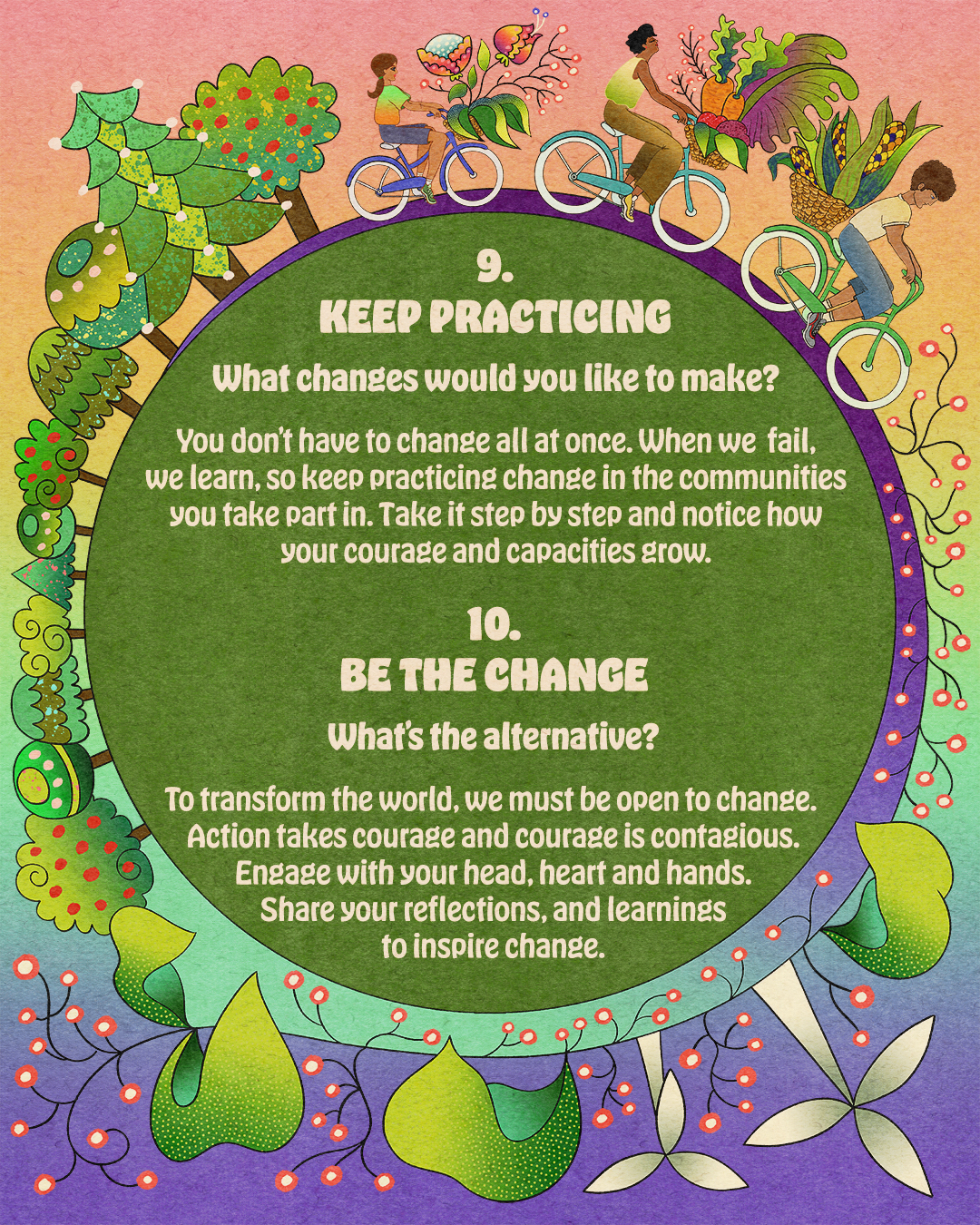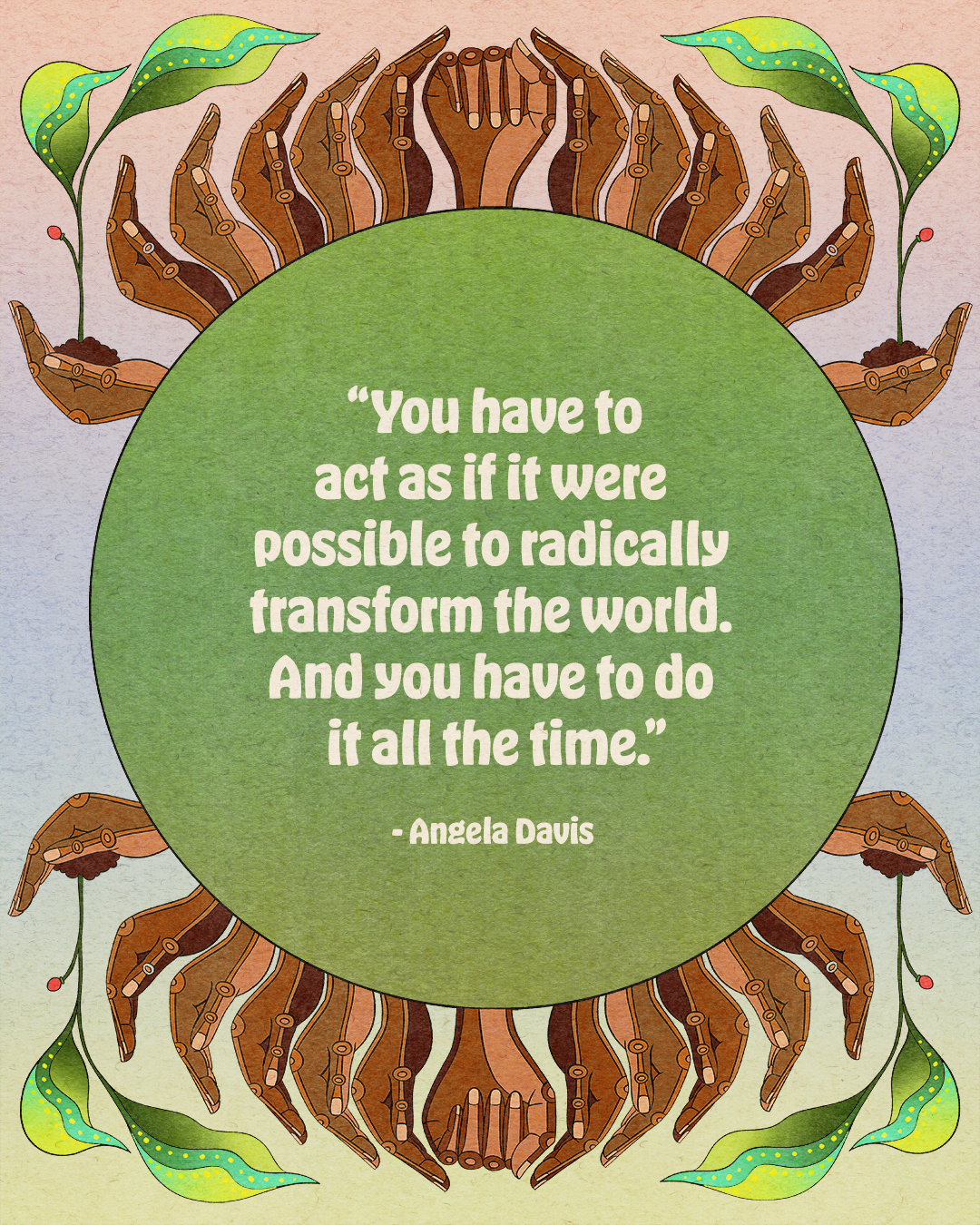10 things you can do in response to the climate crisis

This guide provides ideas and resources to help you ease into climate action and create transformational change in your communities.
Climate change is such an enormous challenge. Our political leaders should have come up with a just and adequate response decades ago. Sadly, that did not happen, so here we are, still grappling with the question: How do we respond to climate change?
The climate crisis is not just a political and practical issue, and that may be one of the reasons why politicians have failed in their response. Climate change is deeply personal, meaning that a truly transformational response involves change on the level of beliefs, values, worldviews and paradigms - the very things that shape structures and systems, as well as human behaviors and technical responses.
Our guide proposes 10 ways of responding to climate change that are meaningful, hopeful, creative, and attentive to values, emotions and cultures - especially indigenous knowledge and wisdom, which represents alternative belief systems, worldviews and paradigms.
This guide is a collaboration between Climate Creativity, cCHANGE (text) and Chrystalla Suï (art and design).
1. Ask questions
It takes courage to ask difficult questions. If you ask yourself whose land you are on, the answer might be uncomfortable and lead you to question your relation to the land and the people who lived there before you. Listen deeply to the answers that emerge, and the process of critical questioning might also become extremely rewarding as you connect with values and emotions and gain new insights.
TED talk: The Value of Deep Listening - The Aboriginal Gift to the Nation by Judy Atkinson, a Bundajung woman and expert in understanding intergenerational healing and recovery from trauma in Aboriginal peoples.


2. Align with your values
Living according to our values includes discovering what our values truly are and how we can align with these values so they guide our decisions in real life. We have so much to learn from Indigenous knowledge, and Indigenous values can help guide our response to climate change.
David Courchene is a knowledge keeper of the Anishinabe Nation. He lists some examples of Indigenous natural laws of living and surviving on the land, grounded in values such as respect, gratitude and love:
Don’t take more than you need from the land to survive. If you take too much, your greed will increase. Treat all life with respect, and abundance will return to you. Show gratitude for whatever you receive from life, and life will return its blessings. Give back to the earth by returning her love, and making offerings, a common practice of Indigenous people, and the earth will continue to sustain you. Social scientist Brené Brown provides practical advice on how to align with your values in her many books. Use your local library to access the books if you want to locate them in a way that aligns with values such as community and shared knowledge.
Article: Indigenous Values on Climate by David Courchene, a knowledge keeper of the Anishinabe Nation and founder of the Turtle Lodge, an international center for Indigenous education and wellness, located in Sagkeeng First Nation, Manitoba, Canada.
Books: “Daring Greatly” and “Dare to Lead” by social scientist Brené Brown.
3. Build community
We are all connected. Humans are social animals that need community to thrive, so building community is a great way to create a thriving world. Communities can be built and maintained everywhere - at home, at work, at your local pub or sports club.
If you work with climate change or want to become engaged in climate action, you may find support in a community built specifically around this work. “The Climate Workers Circle” is a weekly circle for climate workers around the world to unite, share, listen, learn from each other, and together grow the courage and resilience to keep on doing the work. You may also find local climate cafés in your area.
Online community: The Climate Workers Circle, hosted by One Resilient Earth.


4. Show others they matter
People are at different stages in becoming engaged in climate action. Some are just becoming aware of the issue, others have been speaking out and working on this for decades - everyone needs support to keep going. Showing others that they matter can take many forms, from starting new conversations to giving back your land.
In this beautiful episode of the Palestine Pod, you can learn about the Land Back movement and the Palestinian movement for equal rights and freedom. The episode provides insights on the important ways these movements support each other - and how you too can be a supporter.
Podcast: Land Back & back to the land with Lyla June, episode of the Palestine Pod.
5. Create the future
What if…
Give yourself time to finish that sentence. Our world is full of social and physical structures made by people. We are part of creating the world in which we live. Not everyone has equal access to making decisions, but we all have the capacity to imagine a different world and take part in shaping it.
Climate Creativity has two projects that help individuals and communities write, draw and share the future they want - with a special focus on uplifting the voices of marginalized and frontline communities. Through Climate Cards you can write/draw your vision of the future on a card, and through Climate Illustrated you can share your personal climate change story/vision and/or illustrate such a story.
Projects: Climate Cards and Climate Illustrated by Climate Creativity.


6. Become political
Politics are much more than elections and lawmaking. It can be defined as the way we organize society. This opens up a bunch of new avenues for becoming political. Feminists have shown us how politics is personal. When we challenge the dominating values and narratives in society - with our words or actions - this is a political act.
Activism is a familiar way of changing politics. Alternative approaches to activism are emerging and showing that activists can change not just legislation but the way we view the world.
While the thousands of protesters at Standing Rock failed to stop the Dakota Access pipeline, they gave name to a new type of activists. “Water protectors” are activists around the world whose philosophy and approach is rooted in an Indigenous cultural perspective that sees water and the land as sacred.
Wiki article: Water protectorsz

7. Reconnect with nature
Humans are mammals. We know this, but somehow most humans don’t seem to identify as an animal. The majority of people live in cities and need to reconnect with nature to remind themselves that humans are not just part of nature - we are nature.
Spending time in old forests, the ocean, rivers and streams, the savannah, and mountains free of modern infrastructure and technology has robust effects on people’s health — physically, mentally, and emotionally. It reduces stress and promotes healing.
Saving seeds is a beautiful way to reconnect with nature and to be amazed by the abundance of nature. There are seed libraries/collectives all over the world that you can engage with, and you can also start your own.
Website: The why and how of seed saving from Seed Savers Exchange
Article: Simple Steps to Starting a Seed Library by Emily Weak.

8. Take care of yourself
The impacts of climate change are escalating. This summer catastrophic weather around the world has led to deaths and major destruction of homes, infrastructure and natural places. Higher temperatures are tied to higher suicide rates. Fires, hurricanes and heat waves can cause trauma and depression.
Climate anxiety is on the rise - especially among young people - and so is the need for mental health intervention or spiritual care. Anxiety and emotions like fear and anger are not bad, they are a rational response to climate change and should not be ignored but embraced. Allow yourself to feel while practicing self-care and compassion. An important part of embracing your emotions is to connect with others and share feelings and reactions to the climate crisis.
It is important to recognize that Black, Indigenous and People of Color (BIPOC), as well as women and children, especially in frontline communities, are more at risk of being negatively impacted by climate change. Being aware of the justice dimensions of this issue, professor Sarah Jaquette Ray suggests that people with privilege can shift their focus from “What can I do to stop feeling so anxious?” and “What can I do to save the planet?” to “Who am I?” and “How am I connected to all of this?”.
Opinion article: Climate Anxiety Is an Overwhelmingly White Phenomenon by Sarah Jaquette Ray
News article: How to Calm Your Climate Anxiety by Molly Peterson.
Podcast: #134: Alex and Dr Megan Jones-Bell Talk The Science of Mindfulness, episode of Time To Talk With Alex Holmes

9. Keep practicing
History shows us that collective movements are always energized by small, positive changes that create ripple effects over time.
Change can be approached as an experiment. When we start exploring and practicing change, we start to question our assumptions, habits and loyalties. We start to see things differently and discover new solutions and how we are in fact part of those solutions. We start to talk about change and challenges, we share stories, and we inspire friends, colleagues, and people that we don’t even know. In short, we expand our sphere of influence. Ripples become waves.
The support of a community is important in processes of change. cCHALLENGE is a tailored 30-day change experiment, with weekly mentoring, developed by social scientist Karen O’Brien.
Program: cCHALLENGE, developed by professor Karen O’Brien for cCHANGE.
10. Be the change
It’s cliche, but very true: We have to be the change we want to see in the world. When we challenge dominant narratives, values and social norms we create alternatives for a future where all life can thrive.
Angela Davis said that “You have to act as if it were possible to radically transform the world. And you have to do it all the time.”
Luckily we don’t have to do it alone. There are so many awesome people and communities around the world that we can turn to for inspiration and motivation - and you can become one too.
In this process of becoming change, let yourself be inspired by others who take action and share knowledge. As a start, follow @intersectionalenvironmentalist, @badactivistcollective, @birds_of_india and @vanessanakate on Instagram.
